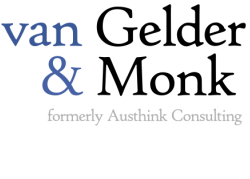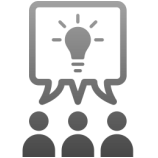Getting Started workshops
|
Many organisations have "just in time learning" needs. They want to apply the best techniques on the task at hand, but the timing of training or recruitment doesn't always work out.
Our "Getting Started" workshops provide you with an experienced leader to help your team apply analytical techniques to a real project or problem their facing. We show how to structure the information, how to apply modelling and mapping techniques and give the team enough of a start that they can take it further. |
The Getting Started approach will give you the best combination of cost-efficiency, knowledge-transfer and best practice. We include:
- A preliminary meeting to discuss the situation and preparations
- A one-day workshop to apply analytical techniques to the task at hand.
- Workbooks, templates and tools
Strategic Planning
An often missed step after the typical "off-site" brainstorming activity is the substantive analysis and deliberation about the various ideas that have been presented. However, the stakeholders will certainly look for this analysis in the deliverables of the strategy process. We can help you get started by:
- Applying issue structuring and framing to the current organisational situation, ensuring that elicitation of ideas (e.g. brainstorming) aims at the real issues and priorities
- Apply argument mapping to strategic questions, so that the decisions are backed up by a credible rationale that is clear to all stakeholders.
- Apply scenario thinking to longer term or more complex challenges, so that the strategy is resilient and sufficiently broad
Business Case Modelling
Deciding to go ahead (or not) with a project is one of the most common decisions that organisations make. Mature project management practices advocate using a cost-benefit analysis as part of the business case to support that decision. However, such analysis is often superficial, because many project managers and business analysts are not sure how best to quantify benefits. We can help you get started by:
- Applying conceptual modelling to the business case to identify scope of costs and benefits
- Apply argument mapping to focus on the key criteria and priorities that influence project value
- Formulate cost and benefits models to help estimate and clarify uncertainties
- Apply numerical simulations to estimate the range of outcomes and identify the most sensitive dependencies
- Use the simulation models to calculate the value of further information and analysis
External Submissions
The triple bottom line means that most organisations look further than the financials into their corporate citizenship and environmental concerns. Often, managing these issues involves submissions to external stakeholders, such as government committees or issue forums. The submissions typically involve many elements of operational, commercial, legal and social reasoning -- which can be challenging. We can help get you started by:
- Apply issue structuring and framing to identify key issues
- Apply argument mapping to ensure a credible rationale is put forward
- Use visualisation techniques to clarify the argument

